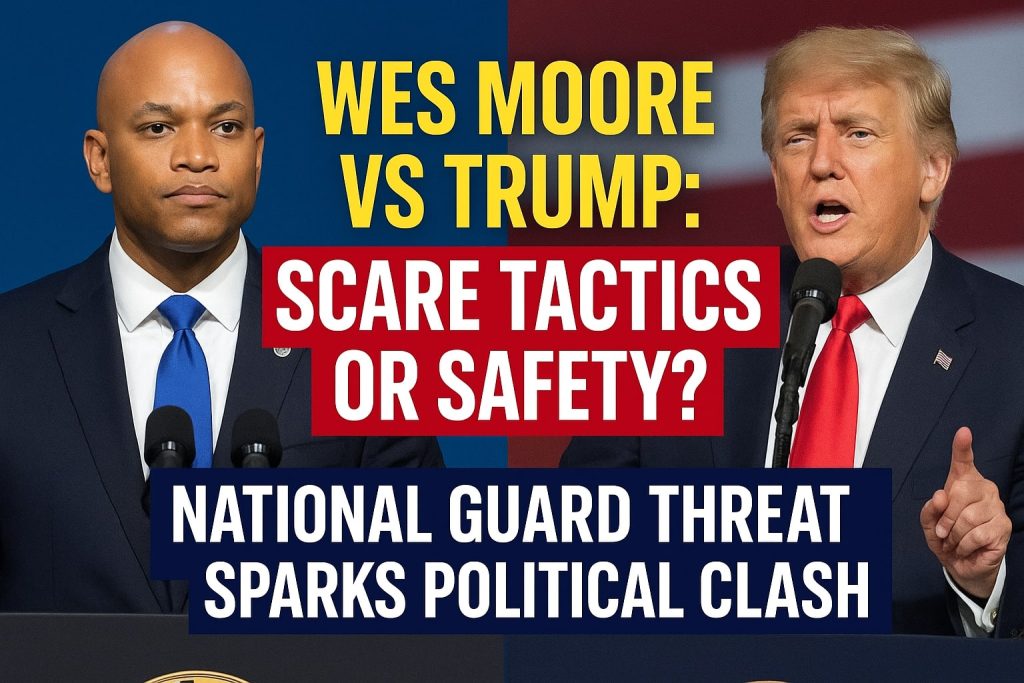
In a sharp rebuke that has quickly become one of the most talked-about stories in U.S. politics today, Maryland Governor Wes Moore accused President Donald Trump of using “scare tactics” to stoke fear about crime across America. The comments come after Trump threatened to deploy the National Guard to several Democratic-led cities, escalating a heated political feud between state leaders and the White House.
Trump’s “Law and Order” Push
President Trump has made crime and public safety a central theme of his political messaging, particularly as the 2026 midterm elections draw closer. Over the weekend, he again raised the possibility of sending federal troops or National Guard units into Baltimore and other major U.S. cities, claiming local officials have failed to control violent crime.
“American families deserve to feel safe,” Trump said during a rally. “If Democrat governors and mayors won’t do their job, I will.”
The comments mirror earlier threats directed at Chicago, Washington D.C., and Philadelphia — cities Trump has repeatedly painted as examples of “Democrat-run chaos.”
Wes Moore Pushes Back
Governor Wes Moore, who has quickly risen as one of the Democratic Party’s most visible leaders, fired back at Trump’s remarks, calling them “nothing but political scare tactics.”
“The President is not serious about solving crime,” Moore said at a press conference in Annapolis. “He is serious about scaring people into supporting him. Maryland doesn’t need troops on our streets — we need investment, jobs, education, and community policing that builds trust.”
Moore went on to emphasize that crime prevention must come from long-term strategies, not temporary military presence. “Deploying the National Guard might make for a good headline, but it doesn’t solve the underlying issues,” he said.
Democrats Rally Around Moore
Moore’s response drew praise from other Democratic officials, who argue that Trump is more interested in political theater than effective policy.
- House Minority Leader Hakeem Jeffries said Moore “hit the nail on the head” by exposing Trump’s strategy of fear-based politics.
- Civil rights groups warned that Trump’s threats risk militarizing local communities and undermining constitutional limits on federal power.
- Local leaders in Baltimore echoed Moore’s call for “real solutions” instead of federal crackdowns.
Republicans Back Trump’s Plan
While Democrats pushed back, Republican leaders defended Trump’s rhetoric, saying federal action is necessary when cities fail to keep crime under control.
“The numbers don’t lie,” said Rep. Andy Harris (R-MD). “Baltimore has had one of the highest violent crime rates in the country for years. If the governor won’t act, then the President has a duty to step in.”
Republican strategists believe Trump’s “law and order” message will resonate with suburban voters who are increasingly concerned about safety.
The Politics Behind the Clash
Analysts say the back-and-forth between Trump and Moore is about more than crime policy — it’s about the political narrative heading into 2026.
- Trump’s strategy: portray Democratic cities as unsafe, casting himself as the only leader willing to take bold action.
- Democrats’ strategy: frame Trump as an authoritarian figure using fear to distract from his failures and undermine local democracy.
Moore, often mentioned as a future presidential contender, has positioned himself as a strong Democratic counterweight to Trump. His fiery pushback not only defends Maryland’s autonomy but also boosts his national profile.
Public Opinion Divided
Recent polls show Americans are deeply divided on the issue:
- About 52% of Republicans support the idea of deploying federal troops to address crime.
- 68% of Democrats oppose the measure, viewing it as unconstitutional federal overreach.
- Independent voters are split, with many agreeing crime is a problem but disagreeing on whether military-style solutions are appropriate.
This split suggests the debate could become a defining campaign issue in the upcoming elections.
Conclusion
Maryland Governor Wes Moore’s rebuttal to Trump’s “scare tactics” underscores a larger national debate over crime, federal authority, and political messaging. While Trump leans heavily on his familiar “law and order” playbook, Democrats like Moore argue that real solutions come from community investment and smarter policing — not military deployments.
As both sides double down, the fight over crime policy is likely to remain at the center of America’s political conversation, shaping not only the 2026 midterms but also the future of leadership within both parties.



